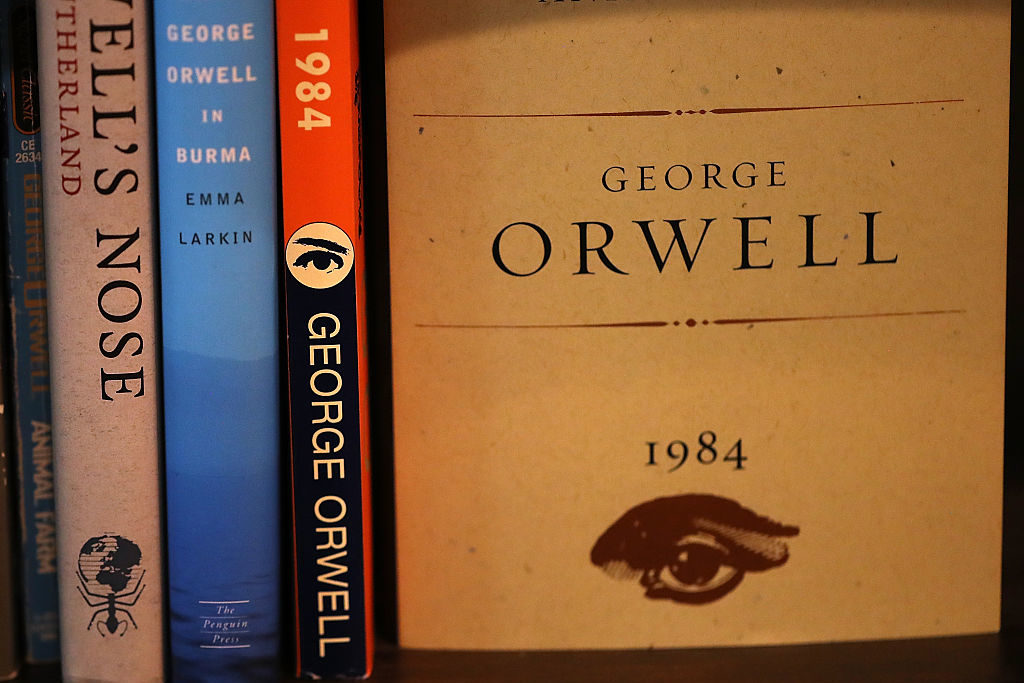Is there a literary cliché more dull than saying of some old yellowing book that it is ‘as relevant today as it was when it was written’? This month marks the 70th anniversary of George Orwell’s Nineteen Eighty-Four. Journalists on both sides of the Atlantic – to whom Orwell is a holy patron saint – have clacked out lengthy tributes (and entire whole books) to St Orwell’s most famous work.
What, they ask, does Nineteen Eighty-Four mean today? Well my answer, for whatever that’s worth, is: nothing. Nineteen Eighty-Four has nothing new to say to us and we have almost nothing new to say about Nineteen Eighty-Four. Realistically, we have very little left to say about George Orwell too. This is not to debunk him, dethrone him or, God help us, decolonize him.
Orwell the monument will likely be with us for as long as Shakespeare or Milton. The authoritative voice, especially in the essays, is as timeless and quotable as ever. It instantly evokes that composed, largely benevolent, somewhat aggrieved Englishman. Here making tea, there calculating the cost of his books and cigarettes; daydreaming about his ideal pub. Orwell is superbly and straightforwardly sane. Such is the immense influence of his voice that it sometimes seems as if the entire intellectual life of England between 1939 and 1949 was conducted in the brain of this one man.
But the relevance of this monument to the present day? Well, as Robert Musil writes somewhere, there is nothing as invisible as a monument.
Nineteen Eighty-Four was the last novel Orwell wrote before he died. It is both a grim satire of the material conditions of post-Blitz London and an outrageous lampooning of the anti-democratic tendencies of the intellectual left in Britain at that time. It is not a novel remembered for its plot or its characters (though these have been taken apart and put back together again by commentators more times than a filthy engine in a fifth-hand banger), but for its themes, its concepts. Doublethink. Big Brother. Two Minutes Hate. War is Peace, Freedom is Slavery, Ignorance is Strength. Room 101. Thought Crimes and Thought Police to stub them out. Newspeak.
These ideas have been applied to everything and anything, usually under the shade of the adjectival umbrella of ‘Orwellian’. Orwellian simply means bad. A long queue at an airport is Orwellian. China’s social credit system is Orwellian. Kellyanne Conway gassing on cable news, oh yes that too is Orwellian. If this is what makes Nineteen Eighty-Four relevant – as a source of dead fish to lob at whatever we disagree with – rather than considering exactly what it is about the things we disagree with in themselves that is objectionable, then the novel has probably come to obscure more than it reveals. Or to put it a different way, it is a novel with the meaning drained out, leaving behind an empty lake with no fish left in it.
Take away these forever ‘relevant’ concepts and what are you left with? Nineteen Eighty-Four is a great novel of textures: the sticky gin, the smell of cabbage soup, the desolate ruins of old squares filled with coughing proles. There is dirt, there are broken windows, and an overwhelming sense of life lived after a terrible smash-up. This is Orwell the journalist reporting from bombed out London in 1949. What kind of textures would you expect to see in a contemporary city? Wouldn’t they be decadent rather than indigent? Smoothness and speed for those who can afford it, stress for those who cannot. Advertisements for corporations and sovereign celebrities more influential than nations. Post-modern glass towers full of post-literate people working in the post-industrial economy. This city could be New York or Frankfurt or Sydney or Zurich or London or Singapore – sometimes it’s hard to tell the difference. What ‘enduring relevance’ does Nineteen Eighty-Four have to this world?
None, of course. If the last decade has shown us anything at all, it is that a powerful totalitarian state is no longer needed to coerce human beings. People will merrily rat on each other, hurt each other and tear each other down in exchange for more Twitter followers.
Orwell and Nineteen Eighty-Four are not kept alive by literary critics or by university departments. What novelistic imitators he has today largely write dystopian young adult fiction. As impressive as Orwell’s achievements were, he inspired few serious novelists. His main cultists are journalists. In fact, I’m fairly sure that there isn’t a single senior (invariably male) journalist in the English-speaking world who doesn’t have a few chapters for a book on Orwell tucked away in a desk somewhere.
Orwell’s appeal to them is simple. He lived through the rise and fall of Fascism, the consolidation and expansion of Stalinism, and the greatest war of all time. Has there ever been an era that provided better copy than that? As a journalist Orwell rose to the challenge of his age better than most. This is what Nietzsche considered ‘something very rare but a thing to take delight in: a man with a finely constituted intellect who has the character, the inclinations and also the experiences appropriate to such an intellect.’ Orwell’s intellect was exquisitely placed to measure the objective circumstances of the world in those times. His rough and ready epistemological approach, slumming it with the workers in Wigan and facing down Franco is Spain, created an aspirational model for a certain kind of macho reportage.
Two hacks who fell harder for it than most in our own time were George Packer and Christopher Hitchens. The former edited two collections of Orwell’s essays, while Hitchens wrote his little pamphlet Why Orwell Matters (2002) just after 9/11. Reading their writing from this time, it is clear that Orwell was their North Star. They wanted to be as right about al-Qaeda and Saddam as Orwell was about Fascism and Hitler. They began to argue for a muscular liberal interventionism to defend America, just as Orwell had argued for a muscular, patriotic leftism to defend England in 1939. Here is Packer writing in The New York Times Magazine:
‘September 11 made it safe for liberals to be patriots. Among the things destroyed with the twin towers was the notion held by certain Americans, ever since Vietnam, that to be stirred by national identity, carry a flag and feel grateful toward someone in uniform ought to be a source of embarrassment.’
It is no accident that the passage above echoes Orwell’s realization, recorded in his essay My Country Right or Left (1940) that he would fight for England:
‘I was patriotic at heart… To this day it gives me a faint feeling of sacrilege not to stand to attention during “God Save the King”. That is childish of course but I would sooner have had that kind of upbringing than be like the left-wing intellectuals who are so “enlightened” that they cannot understand the most ordinary emotions.’
After 9/11, for Packer and for Hitchens, Orwell became a kind of pattern recognition software, a guide for working out the correct way to respond to events. Toughness and clear-sightedness seemed to be the order of the day. Hitchens’s Iraq War writing, in particular, reads now as a doomed attempt to replicate the awesome drama Orwell wrote about in the summer of 1940 in the sand-blasted wastes of Mesopotamia in the spring of 2003.
Trillions of dollars and hundreds of thousands of wrecked lives later, it is clear that Saddam wasn’t Hitler. Packer and Hitchens weren’t George Orwell either. Perhaps then it would be wise not to lean too heavily on Nineteen Eighty-Four when confronting the various challenges and terrors that lurk in our near-future.

























